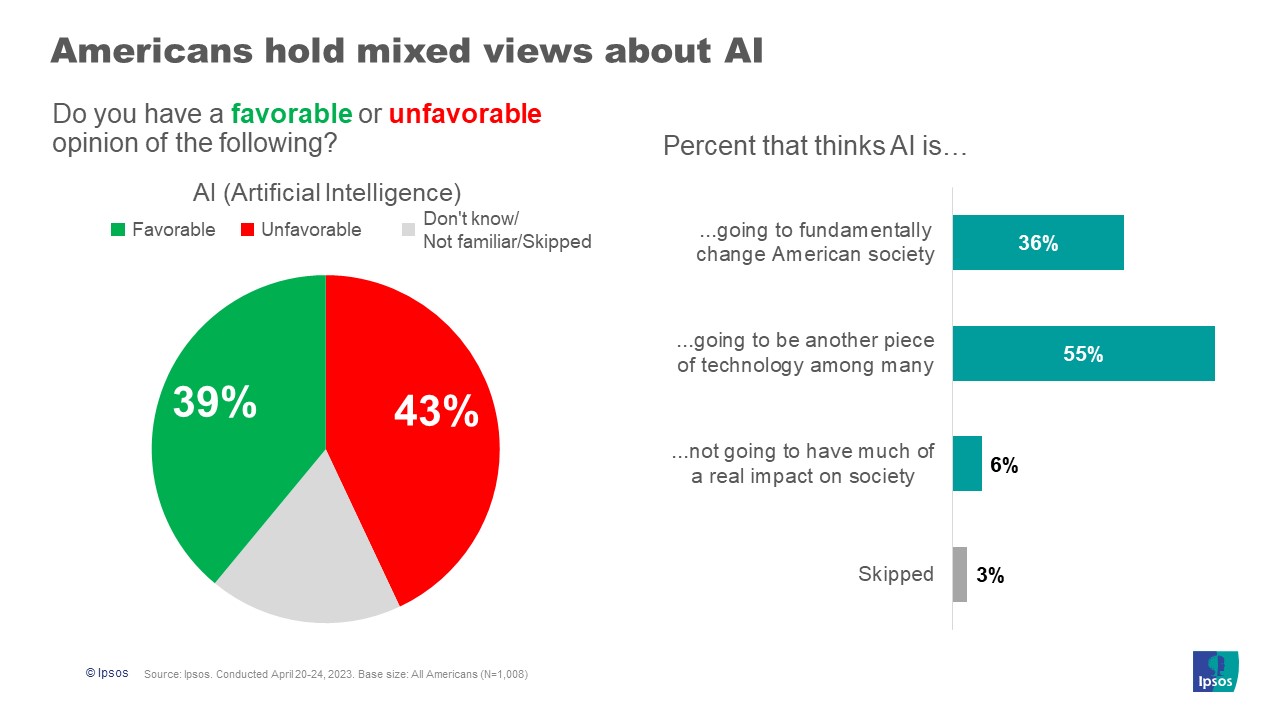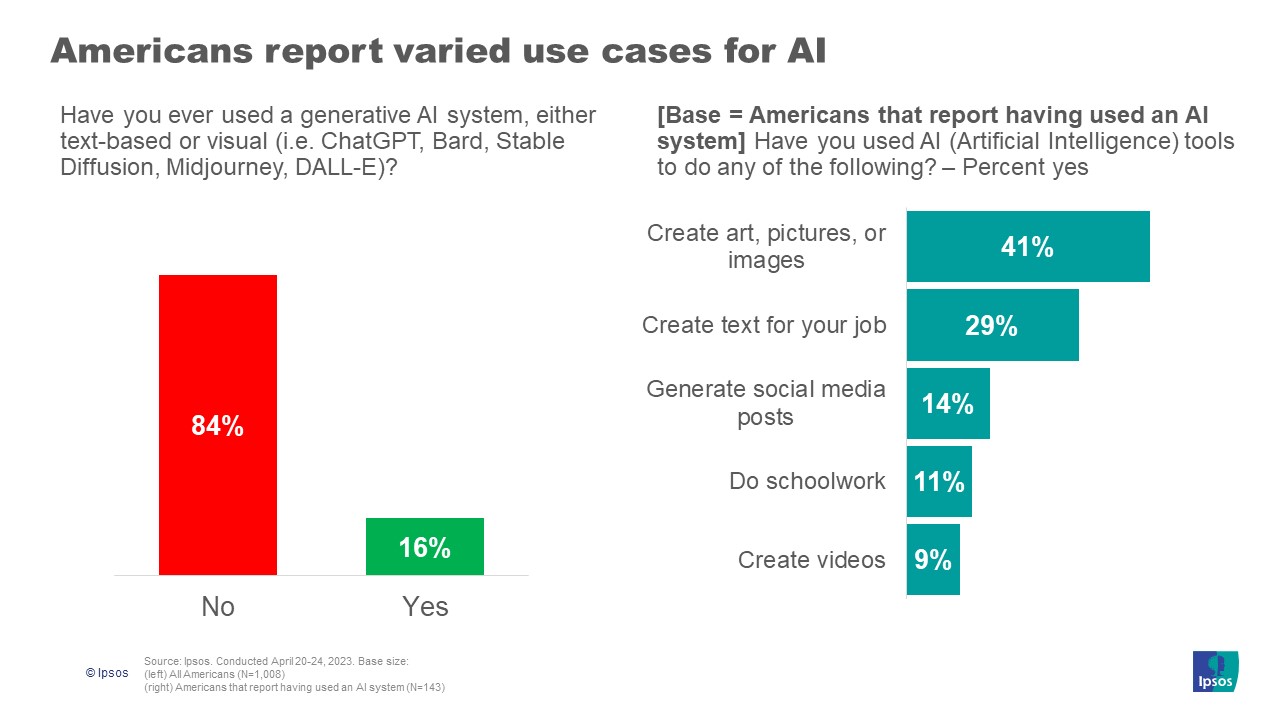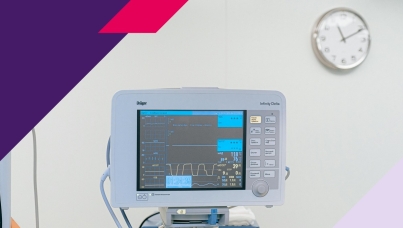Americans hold mixed opinions on AI and fear its potential to disrupt society, drive misinformation
Washington, DC, May 4, 2023 – The majority of Americans are concerned about the impact Artificial Intelligence (AI) could have on society, according to the findings of a new Ipsos poll exploring attitudes toward the tech sector. Americans are also divided on whether they view AI favorably or unfavorably and over who should be make sure AI is developed safely. Even though AI technology has only recently become widely available to the public, one in six Americans report having used a generative AI program like Chat-GPT or DALL-E.
Separately, Americans’ views about pressing tech-related issues facing the country remain unchanged since 2021, while most are also concerned with the spread of disinformation, social media-driven radicalization, and mental health issues caused by digital technology.
Detailed findings:
- Americans are divided on how they view AI but many are concerned about its potential impacts.
- Nearly the same amounts of Americans view AI favorably (39%) as they do unfavorably (43%), while 13% of Americans didn’t know and 4% of Americans were not familiar with AI. But the majority of Americans (71%) are concerned of the impact AI could have on jobs and society. Three in four (76%) are also concerned about deepfakes driving misinformation.
- Just over half of Americans (55%) think AI will be another piece of technology among many, while a third (36%) thinks AI will fundamentally change American society. Only 6% think AI won’t have much of an impact on society.
- Americans don’t agree on who they think should be the ones responsible for limiting the risks of AI: 53% think it’s the responsibility of the companies developing AI, while 44% think it’s the responsibility of the government. At the same time, Americans don’t fully trust companies to develop AI systems with the public’s well-being in mind – while 25% have a great deal or somewhat trust AI companies to do so, 75% have little to no trust.

- Americans’ uses of AI have varied, though only a fraction of Americans report having used AI programs.
- Sixteen percent of Americans report having ever used a text-based or visual generative AI system, such as ChatGPT, DALL-E, Bard, Midjourney or Stable Diffusion.
- So far, the most common use case of AI among Americans who report using a text-based or visual AI system has been to create art, pictures, or images. Three in ten (29%) report having used AI to create text for their job, while 14% used AI to generate social media posts and 11% used AI to do schoolwork.

- Americans’ views of the most pressing tech-related issues facing the country remain largely unchanged since 2021.
- Between 2021 to 2023, similar proportions of Americans are concerned about hacking, malware, and data breaches (86% in 2023 vs. 87% in 2021), social media-riven radicalization (78% vs. 79%), and disinformation, conspiracy theories, and fake news (77% vs. 80%).
- Many Americans are also concerned about national security threats posed by technology developed in other countries (78%) and digital technology driving mental health issues among young people (80%).
- Still, Americans still view the impacts of the tech industry relatively favorably. Three in four (74%) Americans say the tech industry generally has a good impact on the lives of average Americans, while 73% said the same in 2021.
About the Study
This Ipsos poll was conducted April 20-24, 2023, by Ipsos using the probability-based KnowledgePanel®. This poll is based on a nationally representative probability sample of 1,008 general population adults age 18 or older, 286 Republican interviews, 292 Democrat interviews, and 323 independent interviews.
The margin of sampling error for this study is plus or minus 3.3 percentage points at the 95% confidence level, for results based on the entire sample of adults. The margin of sampling error takes into account the design effect, which was 1.15 for all respondents. The margin of sampling error for this study is plus or minus 6.1 percentage points at the 95% confidence level, for results based on the sample of Republican adults. The margin of sampling error takes into account the design effect, which was 1.09 for all Republican respondents. The margin of sampling error for this study is plus or minus 6.1 percentage points at the 95% confidence level, for results based on the sample of Democratic adults. The margin of sampling error takes into account the design effect, which was 1.13 for all Democratic respondents. The margin of sampling error for this study is plus or minus 5.8 percentage points at the 95% confidence level, for results based on the sample of independent adults. The margin of sampling error takes into account the design effect, which was 1.11 for all independent respondents
In our reporting of the findings, percentage points are rounded off to the nearest whole number. As a result, percentages in a given table column may total slightly higher or lower than 100%. In questions that permit multiple responses, columns may total substantially more than 100%, depending on the number of different responses offered by each respondent.
The survey was conducted using KnowledgePanel, the largest and most well-established online probability-based panel that is representative of the adult US population. Our recruitment process employs a scientifically developed addressed-based sampling methodology using the latest Delivery Sequence File of the USPS – a database with full coverage of all delivery points in the US. Households invited to join the panel are randomly selected from all available households in the U.S. Persons in the sampled households are invited to join and participate in the panel. Those selected who do not already have internet access are provided a tablet and internet connection at no cost to the panel member. Those who join the panel and who are selected to participate in a survey are sent a unique password-protected log-in used to complete surveys online. As a result of our recruitment and sampling methodologies, samples from KnowledgePanel cover all households regardless of their phone or internet status and findings can be reported with a margin of sampling error and projected to the general population.
The data for the total sample were weighted to adjust for gender by age, race/ethnicity, education, Census region, metropolitan status, and household income. The demographic benchmarks came from the 2022 March Supplement of the Current Population Survey (CPS).
- Gender (Male, Female) by Age (18–29, 30–44, 45–59 and 60+)
- Race/Hispanic Ethnicity (White Non-Hispanic, Black Non-Hispanic, Other, Non-Hispanic, Hispanic, 2+ Races, Non-Hispanic)
- Education (Less than High School, High School, Some College, Bachelor or higher)
- Census Region (Northeast, Midwest, South, West)
- Metropolitan status (Metro, non-Metro)
- Household Income (Under $25,000, $25,000-$49,999, $50,000-$74,999, $75,000-$99,999, $100,000-$149,999, $150,000+)
For more information on this news release, please contact:
Chris Jackson
Senior Vice President, US
Public Affairs
+1 202 420-2025
[email protected]
About Ipsos
Ipsos is one of the largest market research and polling companies globally, operating in 90 markets and employing over 18,000 people.
Our passionately curious research professionals, analysts and scientists have built unique multi-specialist capabilities that provide true understanding and powerful insights into the actions, opinions and motivations of citizens, consumers, patients, customers or employees. Our 75 solutions are based on primary data from our surveys, social media monitoring, and qualitative or observational techniques.
Our tagline "Game Changers" sums up our ambition to help our 5,000 customers move confidently through a rapidly changing world.
Founded in France in 1975, Ipsos has been listed on the Euronext Paris since July 1, 1999. The company is part of the SBF 120 and Mid-60 indices and is eligible for the Deferred Settlement Service (SRD).ISIN code FR0000073298, Reuters ISOS.PA, Bloomberg IPS:FP www.ipsos.com


